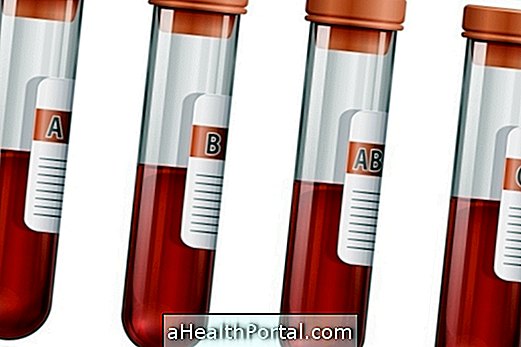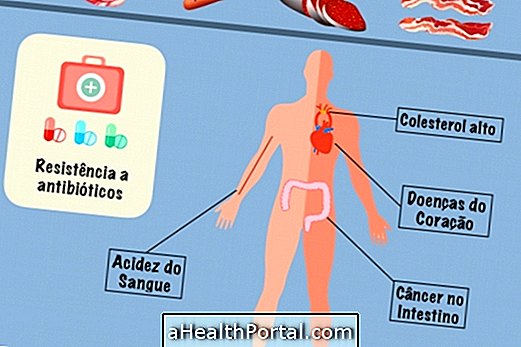Blood types are classified according to the presence or absence of agglutinins, also called antibodies or proteins in blood plasma. Thus, blood can be classified into 4 types according to the ABO system in:
- Blood A : is one of the most common types and contains antibodies against type B, also called anti-B, only being able to receive blood from people of type A or O;
- Blood B : is one of the rarest types and contains antibodies against type A, also called anti-A, only being able to receive blood from people of type B or O;
- Blood AB : is one of the rarest types and has no antibodies against A or B, which means that you can receive blood of all types without reaction;
- Blood O : is known as the universal donor and is one of the most common types, it has anti-A and anti-B antibodies, and can only receive blood from O-type people, otherwise it may agglutinate the red blood cells.
People with Type O blood can donate blood to anyone but can only receive donations from people with the same blood type. On the other hand AB type people can receive blood from anyone but can only donate to people with the same blood type. It is important that the transfusion is only made in people who have compatibility, otherwise there may be transfusion reactions, which can lead to complications.
According to the blood type, there are different types of food that may be more suitable. See what the diet for people with A blood, B blood, AB blood or O blood should be.

What is the Rh Factor
In addition to the classification of blood types according to the ABO system, blood types are also classified according to the Rh factor in + and -. The Rh factor is an antigen present in the red blood cells and should also be taken into account in the transfusion process, otherwise there may be serious complications related to blood transfusion.
People who have the Rh factor are classified as Rh + and can receive blood from people who are both Rh + and Rh-, but can only donate to others who also have Rh +. On the other hand, people who do not have the Rh factor are classified as Rh- and can donate blood to people who do or do not have the Rh factor, however they can only get Rh people.
Compatibility chart for blood donation
The following table shows who can donate blood and who can get it:
| You can donate to : | You can receive donation from: | |
| Blood type A + | AB + and A + | A +, A-, O + and O- |
| Blood type A- | A +, A-, AB + and AB- | A- and O- |
| Blood type B + | B + and AB + | B +, B-, O + and O- |
| Blood Type B- | B +, B-, AB + and AB- | B- and O- |
| Blood type AB + | AB + | A +, B +, O +, AB +, A-, B-, O- and AB- (all) |
| Blood type AB- | AB + and AB- | A-, B-, O- and AB- |
| Blood type O + | A +, B +, O + and AB + | O + and O- |
| Blood type O- | A +, B +, O +, AB +, A-, B-, O- and AB- (all) | O- |
What kind of blood is your child?
Usually the child's blood type is identified shortly after birth through the foot test. However the child's blood type can also be identified through routine blood tests or at the request of the child's pediatrician in order to determine the diagnosis of any disease.
However, knowing the blood type of the parents it is possible to know what the possible possibility of the blood type of the child. Check out the possible blood type of the baby:

In pregnancy, when the mother is Rh negative and the baby is positive there is a probability that the pregnant woman will produce antibodies to eliminate the baby and may lead to an abortion. Therefore, pregnant women with this type of blood should consult their gynecologist to see if there is an indication of anti-D immunoglobulin injection, but there are never any serious problems in a first pregnancy. Here's what to do when the blood type of the pregnant woman is Rh negative.
Who can donate blood
The donation of blood lasts on average 30 minutes and to be done some requirements must be respected, such as:
- Be between the ages of 18 and 65, however, people over the age of 16 can donate blood as long as they have parental or guardian authorization and fulfill the other requirements for donation;
- Weigh more than 50 kg;
- If you have had a tattoo, wait 6 to 12 months to make sure you have not been infected with any type of hepatitis and you are still healthy;
- Do not smoke for 2 hours after giving blood, at risk of fainting;
- Never have injected illicit drugs;
- Wait one year after the cure of any STD;
- Avoid eating fatty foods 4 hours before donating blood.
Men can only donate blood once every 3 months and at most 4 times a year and women every 4 months and at most 3 times a year, since women lose blood every month through menstruation, taking more time time to reset the amount of blood taken. See in what situations it may be forbidden to donate blood.
How to donate blood
The person who wants to donate blood should go to one of the blood collection stations, fill out a form with various questions about their health and living habits. The form will be reviewed by a specialist and, if the person is fit, you can then sit in a comfortable chair for the donation.
A nurse will place a needle in the vein of the arm where the blood will flow into a pouch of its own to store the blood. The donation lasts approximately half an hour and you can apply for leave from work on this day, without having the salary deducted.
At the end of the donation, a reinforced snack will be offered to the donor to replenish their energies, since it is normal for the donor to feel weak and dizzy, although the amount of blood withdrawn does not reach half a liter and the organism soon recovers this loss .
It is safe to donate blood and the donor does not catch any disease because it follows national and international blood safety standards of the Ministry of Health, the American Association and the European Blood Banks Council.

























